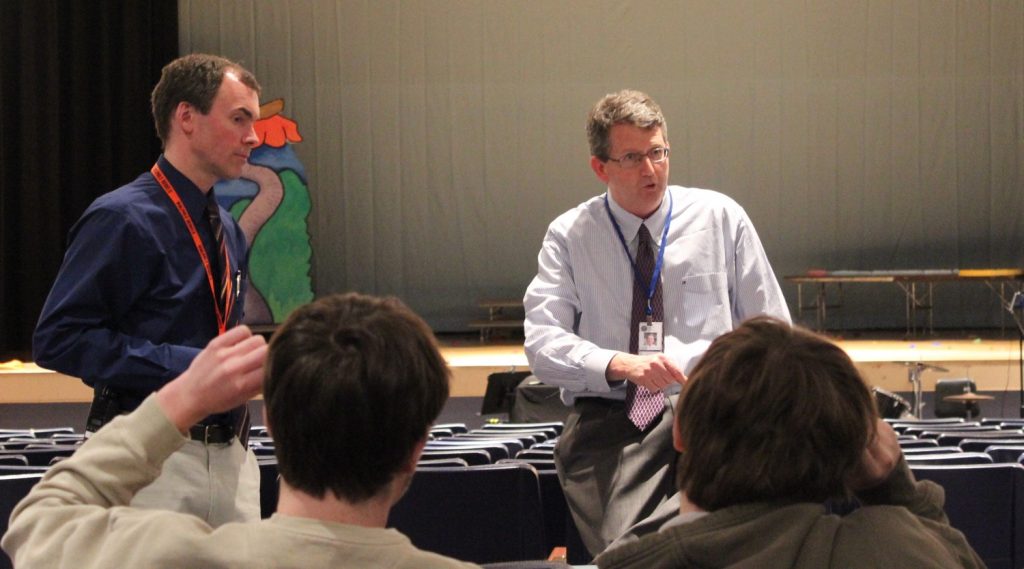
After a whole meeting and a half full of debates and arguing and back and forth, the town meeting representatives finally came to the most contentious issue on the agenda: the issue of security cameras. Each side has been presenting its point in various school forums, from the school committee meeting to the auditorium, from the classroom to the library. The SOS group—not alone in its fight against the cameras—has laid out its various dissensions against the cameras, promoting the right to privacy and criticizing a perceived waste of money. Administrators, teachers, and parents have also discussed their reasons for implementing the cameras, highlighting the safety of the students as the primary argument.
At the town meeting, junior Jon Kelland and seniors Ross Bubly, Sean Herlihy, and Kevin Delaney were given time to voice their opinion to the community members that would ultimately approve or deny the funding for the cameras. After they spoke—along with two or three RTM’s who voiced specific dissensions to the cameras—rejoinders from the superintendent, a School Committee member, the police chief, and other concerned adults ensued. The promotion of safety of the children was evidently paramount in the arguments of those in favor of the cameras, while the students and other members of the community countered with the perceived lack of effectiveness of the cameras, waste of money in instituting the cameras, and message that implementing the cameras sends. After what seemed to be an interminable debate, the measure for the cameras passed, giving the schools the money to commence the implementing of the cameras.
“I think that the cameras pose the wrong message. If we do this, almost 100 percent of the times we use the cameras will be after something happens. Instead, I believe, we should be using this money to stop these events from happening, whether it be investing in mental health or more guidance counselors or something to prevent something bad from happening” said Bubly. “However, the town has made their decision and we have to respect that.”
There will be X amount of cameras, with one placed at the end of each hallway. The cameras will not be able to pick up sound but will be able to see all parts of the hallways. The feed of the cameras records over itself every thirty days, erasing all footage from more than 30 days prior than any day.
Although the cameras were passed, the school has taken the considerations of all the students, parents, RTM’s, teachers, and other community members into the equation. At end of last week, Walpole High School Principal Stephen Imbusch sent out an email looking for volunteers for a committee that would decide on all the concerns—who can use the cameras, when can these people use them, who will be notified when they are used—that people have displayed. Earlier in the year, when the decision of whether the cameras would be implemented was still nebulous, Mr. Imbusch, and Vice Principals William Hahn and Ed Connor understood the importance of creating a policy for the cameras that the students and teachers especially could help create. “This is a very important part of the process,” said Herlihy. “This will set the precedent for the cameras and set the tone for the future.”
Imbusch has said previously that he believes the cameras will be used in three types of situations: recalling footage of theft or vandalism, trying to piece together facts in the event of a fight, or locating an intruder if one happens to make itself into the building. Superintendent Lincoln Lynch has especially stressed the last use of the cameras, saying that the cameras are worth everything if they are able to “save a life” in the event of a school shooting. The SOS group and some RTM’s are concerned with some of these uses, citing the small chance of a school shooting and the slippery slope argument—that the school will continue pushing this policy until the cameras are monitored and used 24/7.
Whatever happens, this issue of the security cameras is not unique nor novel: This debate has been rehashed in politics, theater, and literature—the most conspicuous example being Orwell’s dystopian 1984, in which the arguments discussed in this particular issue are played out in an overblown, futuristic setting. With the implementation of the cameras, there is some belief that we are on the track towards this dystopia, and there is the belief that this is purely for safety and there will be no more escalation of the policy. This new committee that will write the policy will be the first step in setting the precedent for the use of these cameras, marking a very important step for the future of the school, and its cameras.








